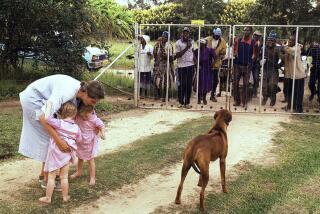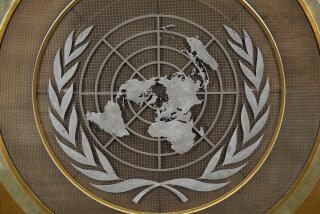Ex-Leader’s Kin Repay Millions to Nigeria
- Share via
LAGOS, Nigeria — The family of late dictator Sani Abacha has been forced to pay back nearly $148 million to Nigeria, an official statement said Thursday, in what appeared to be the largest recovery of stolen funds in the country’s history.
But the sum is minuscule compared with what is still missing. President Olusegun Obasanjo’s government estimates that nearly $3 billion was salted away from oil-producing Nigeria by Abacha and his associates during his 4 1/2-year ironfisted rule.
Obasanjo made recovery of stolen funds a priority after he took over in 1999, ending 15 years of corrupt military rule.
Nigeria’s efforts to recover money it accused Abacha of stealing have forced the world’s major financial centers to examine how illicit funds deposited in their banks can be repatriated to benefit the countries of the crooked politicians who put them there.
“The family of the late head of state, Gen. Sani Abacha, two weeks ago paid back to the federal government” the sum of $147.5 million, presidential spokesman Tunji Oseni said in a statement.
The money came from a British High Court judgment last year ordering Mecosta Securities, owned by the Abacha family, to repay 300 million German marks, or about $138 million, defrauded from the government in a debt buyback scheme, the statement said.
The amount includes $8.7 million in interest.
Obasanjo’s office said the payment was made from a frozen Abacha family bank account in Luxembourg, where two of Abacha’s sons are accused of having stashed $630 million at a subsidiary of a German bank in the name of an offshore company.
Britain’s Financial Services Authority had found that 23 London banks had handled $1.3 billion on behalf of Abacha’s family and friends.
Swiss authorities have frozen $550 million in accounts allegedly belonging to Abacha; his eldest surviving son, Mohammed; widow Mariam; brother Abdulkadir; and entourage. Liechtenstein has frozen $200 million.
In 1999, Switzerland’s Federal Banking Commission took the unusual step of publicly naming and shaming banks for taking deposits tied to Abacha’s family.
More to Read
Sign up for Essential California
The most important California stories and recommendations in your inbox every morning.
You may occasionally receive promotional content from the Los Angeles Times.










